Gustavo Petro became the 42nd president of Colombia this Sunday, in a inauguration classified as historic, not only because he was the first left-wing president of the South American country, but also because he received the presidential sash with the support of feminist, left-wing organizations. , indigenous, Afro-descendant, trade union and ethnic groups, and a majority in Congress.
During the ceremony, Gustavo Petro, 62, walked towards the Plaza de Bolívar in the company of his wife and children. With the unison song “Yes it could, yes it could!” and “Petro, friend, the people are with you”, the citizens greeted the president.
After the national anthem, Roy Barreras, president of the Colombian Congress, swore in the new president. The leftist senator María José Pizarro, in the midst of tears, imposed the presidential sash on him.
“We are here against all odds, against a history that said we were never going to govern,” said the new president of Colombia.
In his inaugural speech, Petro invited the armed groups “to lay down their weapons in the shadows of the past” and to “accept legal benefits in exchange for peace, in exchange for the definitive non-repetition of violence.”
In addition, Petro pointed out that it is necessary to change the policy against drugs. “It is time for a new international convention that accepts that the war on drugs has failed, that it has left a million Latin Americans murdered during these 40 years, and that it leaves 70,000 North Americans dead by overdoses each year, that the war on drugs strengthened the mafias and weakened the States” and “has led the States to commit crimes,” he added.
The new president listed a series of his government’s proposals, including various health, tax, pension and education reforms, and said that he has “prioritized in the budget the infrastructure of education, health, water drinking water, irrigation districts and local roads”.
“Taxes will not be confiscatory, they will simply be fair,” he added, pointing out that the inequality that the country is experiencing is “aberrant.”
The president also stressed the importance of gender equality, climate change and care for the Amazon rainforest.
On a platform in front of Congress, whose columns were adorned with exotic flowers and plants, the leader of the left asked that Bolívar’s sword be present – stolen on January 17, 1974 by the M-19 guerrillas and delivered after agreeing peace, in 1990 – as a symbol of the search for peace, and later took the oath of the first Afro-descendant vice president of Colombia, Francia Márquez.
The inaugural event was attended by 60 national and international delegations. Some 100,000 people and 1,000 artists participated.
Starting in the morning hours, different dance and music groups performed on platforms arranged in the vicinity of the square, where citizens enjoyed folk rhythms.
Luis Carlos Montenegro, representative of the “Let’s go for rights” movement, said that he lived the event “with joy, with festivity, with colors” and that they will ensure that the rights of activists and human rights defenders in their country are respected.
Colombian Sara Cruz told the VOA that now they are going to achieve “what we have dreamed of for many years”.
The young Catalina Frayle pointed out that “there is a lot of happiness. We young people are very aware of all the years we have tried to change this, and it is emotion, it is happiness to feel that we are going to get to a better place”.
Before the official inauguration, Petro attended several symbolic ceremonies. In the Sierra Nevada de Santa Marta, in the north of the country, the Aruhaco Indians gave him their “blessing”. One of the mamos -the highest hierarchy of the community- asked him to respond to the demands of society and gave him a cane that represents wisdom.
Among the guests were King Felipe VI of Spain; the presidents of Chile, Ecuador, Paraguay, Bolivia, Argentina, the Dominican Republic, Honduras and Costa Rica; the Foreign Minister of Brazil, Carlos Alberto França; the Vice President of Panama, José Gabriel Carrizo; the vice president of El Salvador, Félix Ulloa Jr. and the first lady of Mexico, Beatriz Gutiérrez, among others. The president of Venezuela, Nicolás Maduro, was not invited given the deep political differences with Duque.
Samantha Power attended for the United States, Director of the Agency for International Development (USAID).
The security device for the possession included 15,000 members of the Public Force, 10,000 policemen and 5,000 members of the army.
Petro’s Proposals
The presidential sash that Petro will wear carries with it the challenges of overcoming the growing violence that has claimed the lives of more than 560 human rights defenders since 2016, the highest inflation in the last two decades and the search for consensus in a divided country.
Petro promised a nation with less inequality, which will guarantee the rights of all its citizens – especially the most vulnerable – and which will give priority to the environment.
The initiatives of the new government focus on racial justice, the defense of women’s rights, human rights and the care of life and territory.
The economy, inflation, insecurity, inequality, the violation of human rights and the barriers to access to health and education will be the main challenges of the president.
One of its banners has been to achieve “total peace” in a country where, according to figures from the Truth Commission, during five decades of conflict 50,770 people have been kidnapped, 121,768 have disappeared and 450,664 have been killed.
Despite the signing of the Peace Agreement between the State and the Revolutionary Armed Forces of Colombia (FARC), the country is still submerged in violence. Petro has proposed starting the peace process with the National Liberation Army (ELN), and bringing criminal gangs that feed off drug trafficking to justice.
His promises also include a reform of the pension system and the suspension of the granting of mining licenses in favor of renewable energies, which has generated controversy in the business community.
On the other hand, some opponents have expressed fears that with Petro in power, Colombia could become a “second Venezuela”, since the former mayor of Bogotá announced that he will reestablish relations with the neighboring country.
Analysts told VOA that with the reestablishment of relations with Venezuela they expect an economic reactivation in the border area.
After being elected, Petro sought dialogue with his critics and opponents and won a majority in Congress, necessary to carry out different reforms, including the tax reform, which seeks to increase taxes on the upper classes and give resources to social programs.
A former guerrilla who seeks to achieve “total peace” for Colombia
In his youth, Petro was a member of the nationalist guerrilla M-19, which relinquished arms in 1991 after signing a peace agreement with the state.
His past as a rebel weighs heavily on some soldiers who will henceforth be under his command. “We do not anticipate any disturbance, saber rattling, or any of these armed activities,” retired Colonel John Marulanda, president of the Colombian Association of Retired Armed Forces Officers, told The Associated Press.
Marulanda stressed that although it is difficult for the soldiers who fought the M-19 to accept Petro’s arrival in power, in the new generations there is more expectation than resistance.
Although he handed over his weapons, there are still those who feel politically represented by the M-19. Carrying a blue, white and red movement flag, a group of militants harangued through the unusually quiet and heavily policed streets of central Bogotá towards Plaza de Bolívar.
“We are here for our dead, for all the commanders who fell,” Froilán Ospina told the AP, for whom Petro still represents the principles of the extinct guerrilla. “As long as there is a man from the M-19 who raises the flags of democracy, there will be hope for the country, that is Gustavo Petro,” he added.
Although the country has been going through a post-conflict phase for five years after the signing of the Peace Agreement between the State and the Revolutionary Armed Forces of Colombia (FARC) -which was the oldest guerrilla group in Latin America-, the pact did not put an end to the violence. The agreement allowed the reintegration of more than 13,000 former guerrillas into civilian life.
Petro has proposed starting the peace process with the National Liberation Army (ELN), the last active guerrilla in the country, and achieving a “total peace” that implies the submission to justice of the criminal gangs that feed on drug trafficking – like the Gulf Clan.
It will also seek to strengthen ties with its neighbors and especially with Venezuela, a country with which Colombia broke relations in 2019.
Analysts told VOA that with the reestablishment of relations with Venezuela they expect an economic reactivation in the border area. both governments recently agreed to appoint ambassadors.
Journalists Celia Mendoza and Jair Díaz reported from Bogotá. This story was supplemented by a report from The Associated Press.







![[Img #74683]](https://thelatestnews.world/wp-content/uploads/2024/12/The-main-mistakes-to-avoid-when-betting-on-electronic-sports-150x150.jpg)





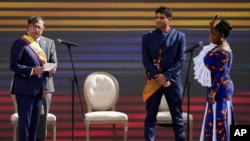
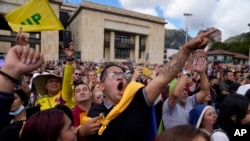
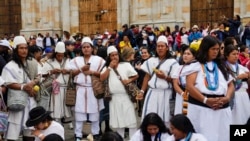
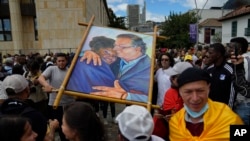
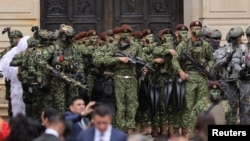



Add Comment